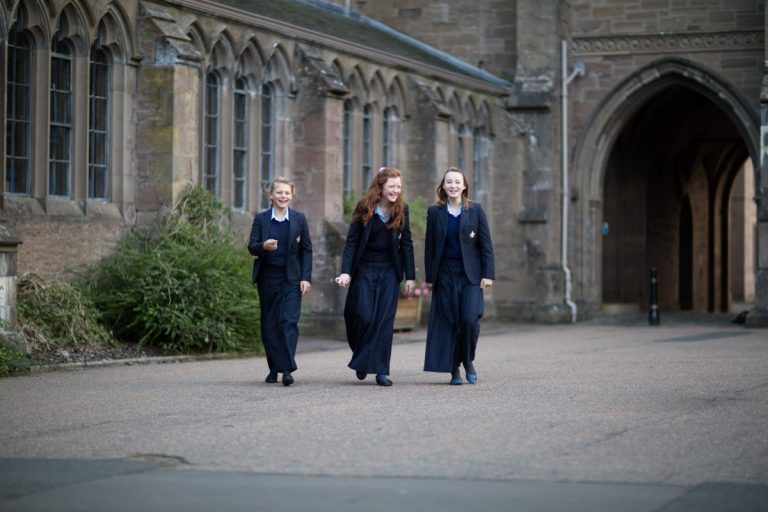
Just a few miles from Perth, surrounded by the beauty of the Scottish countryside, Glenalmond College has thrived since its foundation in 1847. The school has a student body of 400, all of whom make their homes across eight separate boarding houses. Within the historic grounds and rural setting, the school boasts an academic culture very much at the cutting-edge of modern education.
At the core of the school’s mission is an aim to instil in students a deep thirst for knowledge and learning that stays with them for life. Glenalmond College is centred on producing students who, put simply, love to learn. It’s about teaching them to want to push themselves to ever greater heights; to challenge themselves; to succeed; and of course, to learn from their failures. For the school’s teachers, it’s not just about getting students through the next exam; it’s about creating ambitious and driven academic minds.
For a pupil to truly love to learn, they must feel they have the confidence to grow intellectually and independently. The Learning to Learn programme is a much-lauded approach to teaching students not just what to learn, but how to learn. All pupils from Second Year to Upper Sixth Form develop learning skills and strategies that they will use throughout their studies and beyond. Students come to master techniques like academic planning; target setting; revision strategies; mind mapping; note taking; academic presentations; essay planning, and more.

Teaching at Glenalmond puts the student at the heart and builds the conditions around that individual for them to achieve their absolute potential. Although pupils learn as part of a class, their unique strengths, weaknesses, talents and passions are kept at their forefront of their education for the duration of their studies.
To achieve this, staff form an academic profile of each student at the start of their studies, reviewing at regular intervals to assess how best to nurture their strengths and combat their weaknesses. Information from the academic profile is then placed in a predictive model managed by Durham University’s Centre for Evaluation and Monitoring, which assists staff in creating a programme of education best suited to the needs of the respective individual.
Pupils with learning difficulties like dyslexia and dyspraxia are given support that ensures they neither struggle, nor feel left unchallenged with a watered-down curriculum. Instead, the school works hard to teach them strategies that help them overcome their difficulties and compete on a level playing field with their peers.

Academic ambition is so ingrained in Glenalmond’s pupils that for most, the classroom is just one of the places where learning occurs. Between lessons, it’s common for students to meet with their teachers to discuss essays, ideas and queries to advance their understanding of topics and explore new fields. The learning culture is exemplified in the popularity of the many cross-curricular programmes offered, seeking to inspire and crystallise pupils’ grasp of a particular subject. Opportunities are diverse and wide ranging, including activities such as building rockets in the Engineering club or unpicking medieval languages in Linguistics.
When talking about extracurricular opportunities it would be impossible not to mention the hugely popular William Bright Society. This programme is comprised of a lecture series that brings spectacular speakers to the school from a diverse range of topics; from astrophysics to war photography; and The Thinking Series, which consists of a structured workshop curriculum specifically-designed to develop critical reasoning and promote philosophical argument. This programme – which isn’t actually part of any formal qualification – is the school’s most popular society, boasting an attendance rate that’s close to perfect.
It’s one thing for the student to learn, but for a school to be truly excellent, it’s vital that the teaching staff simultaneously grow and evolve. Glenalmond staff are constantly improving by continually examining, testing and developing teaching techniques in order to improve learning outcomes for their students.

The Learning Project holds a long-term mission that analyses the classroom setting in forensic detail to discern what works and what does not. This sounds very scientific, and that’s because it is. Departments carry out in-depth research focused on improving student outcomes, a good example being the English Department’s undertaking of an 18-month research programme investigating how pupils’ results would be affected if they were assigned personal mentors to reflect on their progress at GCSE level. The results speak for themselves: the English GCSE pass rate among the focus group was 100 percent A-A*.
Turning to results more broadly, Glenalmond’s GCSE pass rate is one of the highest in Scotland and Northern England, with the same being said for its success in getting students into the Oxbridge Universities. This is in no small part due to the attention given to Oxbridge candidates long before the application deadline. Potential candidates are identified in the pre-GCSE stage, from which they are mentored and supported to give them the best chance of making their dreams a reality.
At Glenalmond College, it’s clear that the potential in young minds is only the starting point. With its dynamic approach to each pupils’ talents and ambitions, those who study here are given the start in life that ensures academic excellence and success throughout their academic careers and beyond.
Follow Glenalmond College on Facebook, Twitter, YouTube, Flickr and Soundcloud
Liked this? Then you’ll love these…
Impactful Boarding Schools that produce ambitious graduates
5 Schools in the US and UK for a well-rounded boarding education







